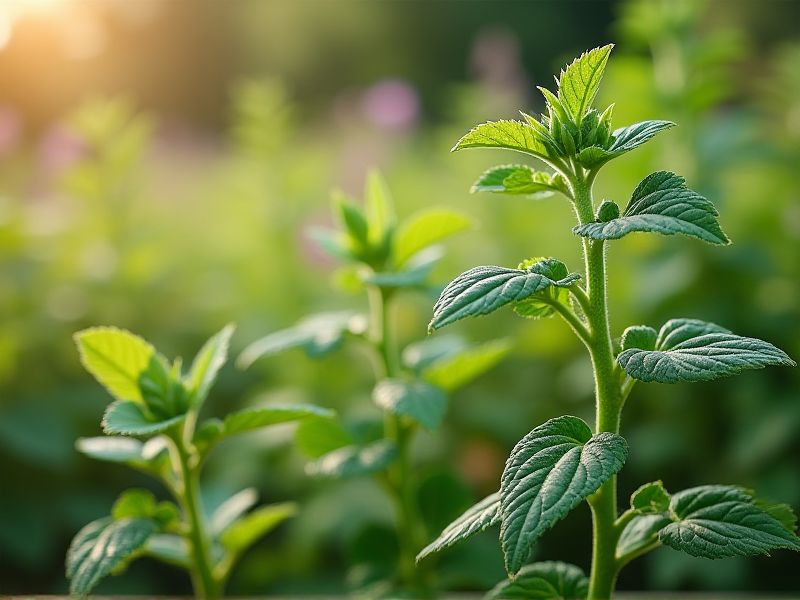
Herbal plants such as peppermint, ginger, and fennel are known for their digestive benefits. Peppermint contains menthol, which helps relax digestive tract muscles, alleviating symptoms of irritable bowel syndrome (IBS). Ginger is rich in gingerol, an active compound that aids digestion and reduces nausea, making it a popular remedy for digestive upset. Fennel seeds, packed with anethole, can relieve bloating and gas, enhancing overall digestive comfort. Incorporating these herbs into your diet can contribute to improved gastrointestinal health.
List of some Herbal plants that promote digestion
- Peppermint (Mentha piperita)
- Ginger (Zingiber officinale)
- Fennel (Foeniculum vulgare)
- Chamomile (Matricaria chamomilla)
- Dandelion (Taraxacum officinale)
- Lemon Balm (Melissa officinalis)
- Licorice (Glycyrrhiza glabra)
- Angelica (Angelica archangelica)
- Caraway (Carum carvi)
- Turmeric (Curcuma longa)
Important things about Herbal plants that promote digestion
Ginger
Ginger, scientifically known as Zingiber officinale, is a powerful herbal plant renowned for its digestive properties. Rich in gingerol and shogaol, compounds that aid in reducing nausea and stimulating digestive enzymes, ginger can significantly improve your gut health. Consuming ginger tea or adding fresh ginger to meals can enhance nutrient absorption and alleviate bloating. Its anti-inflammatory effects further support overall digestive well-being, making it a staple in many holistic health practices.
Peppermint
Peppermint (Mentha piperita) is a renowned herbal plant celebrated for its digestive benefits, particularly in alleviating symptoms of indigestion and bloating. The active compounds in peppermint, such as menthol, stimulate bile flow, which is essential for breaking down fats and facilitating digestion. You can use peppermint tea or essential oil as a natural remedy to soothe gastrointestinal discomfort. Incorporating peppermint into your diet not only enhances flavor but also supports overall digestive health.
Fennel
Fennel (Foeniculum vulgare) is a highly regarded herbal plant known for its remarkable digestive properties. Packed with essential oils like anethole, fennel seeds can help relieve bloating, gas, and stomach cramps by relaxing the gastrointestinal tract. You can easily incorporate fennel into your diet through teas, spices, or raw salads, making it a versatile choice for enhancing your digestive health. Additionally, fennel's antioxidant-rich composition promotes overall gut health, supporting beneficial gut bacteria and improving nutrient absorption.
Chamomile
Chamomile is a well-known herbal plant celebrated for its digestive benefits. Its anti-inflammatory properties can soothe the gastrointestinal tract, making it effective for alleviating indigestion and bloating. Consuming chamomile tea can help relax the muscles of the intestines, promoting smoother digestion and reducing discomfort. Incorporating this calming herb into your routine may enhance your digestive health and provide a soothing nightly ritual.
Dandelion
Dandelion (Taraxacum officinale) is a robust herbal plant renowned for its digestive health benefits. Rich in vitamins A, C, and K, as well as minerals like potassium and iron, dandelion can stimulate appetite and promote bile production, aiding fat digestion. The presence of inulin, a prebiotic fiber, further enhances gut health by fostering beneficial gut bacteria. Incorporating dandelion tea or fresh leaves into your diet may effectively support digestion and alleviate symptoms of bloating and indigestion.
Turmeric
Turmeric, scientifically known as Curcuma longa, is a vibrant yellow herb renowned for its potent digestive properties. This herb contains curcumin, a bioactive compound that aids in the production of bile, facilitating efficient fat digestion and nutrient absorption. Your digestive health can also benefit from turmeric's anti-inflammatory and antioxidant qualities, which help soothe the gastrointestinal tract and reduce bloating. Incorporating turmeric into your diet, whether in teas, curries, or supplements, can enhance overall digestive wellness and support gut health.
Licorice Root
Licorice root, scientifically known as Glycyrrhiza glabra, is renowned for its digestive benefits, primarily due to its soothing properties. This herbal plant contains glycyrrhizin, which can help reduce inflammation in the gastrointestinal tract and relieve symptoms of indigestion and heartburn. Rich in antioxidants and flavonoids, licorice root also promotes the production of digestive enzymes, aiding in the overall digestive process. Incorporating licorice root into your herbal regimen can enhance your digestive health while providing a naturally sweet flavor to teas and tinctures.
Caraway Seeds
Caraway seeds, derived from the Carum carvi plant, are renowned for their digestive health benefits. Rich in antioxidants and essential oils, these seeds can help alleviate bloating, gas, and indigestion by stimulating gastric juices and bile production. Incorporating caraway seeds into your diet can be as simple as adding them to baked goods, salads, or herbal teas. Their warm, slightly sweet flavor not only enhances your dishes but also provides your body with natural support for a healthy digestive system.
Aloe Vera
Aloe Vera is a powerful herbal plant known for its digestive benefits, particularly its ability to soothe the gastrointestinal tract. This succulent contains enzymes, such as amylase and lipase, that help break down carbohydrates and fats, improving nutrient absorption. Rich in vitamins and minerals, Aloe Vera also boasts anti-inflammatory properties that can alleviate constipation and promote regular bowel movements. Incorporating Aloe Vera juice into your daily routine can enhance your overall digestive health and support a balanced gut environment.
Cinnamon
Cinnamon is a powerful herbal remedy known for its digestive health benefits, particularly in alleviating gastrointestinal discomfort and promoting overall digestive efficiency. Rich in antioxidants and anti-inflammatory properties, cinnamon can help regulate blood sugar levels and enhance gut motility, making it easier for your body to process food. By incorporating cinnamon into your diet, whether through tea, capsules, or as a spice in meals, you may experience relief from bloating and gas commonly associated with digestive issues. This versatile herb not only adds flavor but also serves as a natural alternative for improving your digestive wellness.
